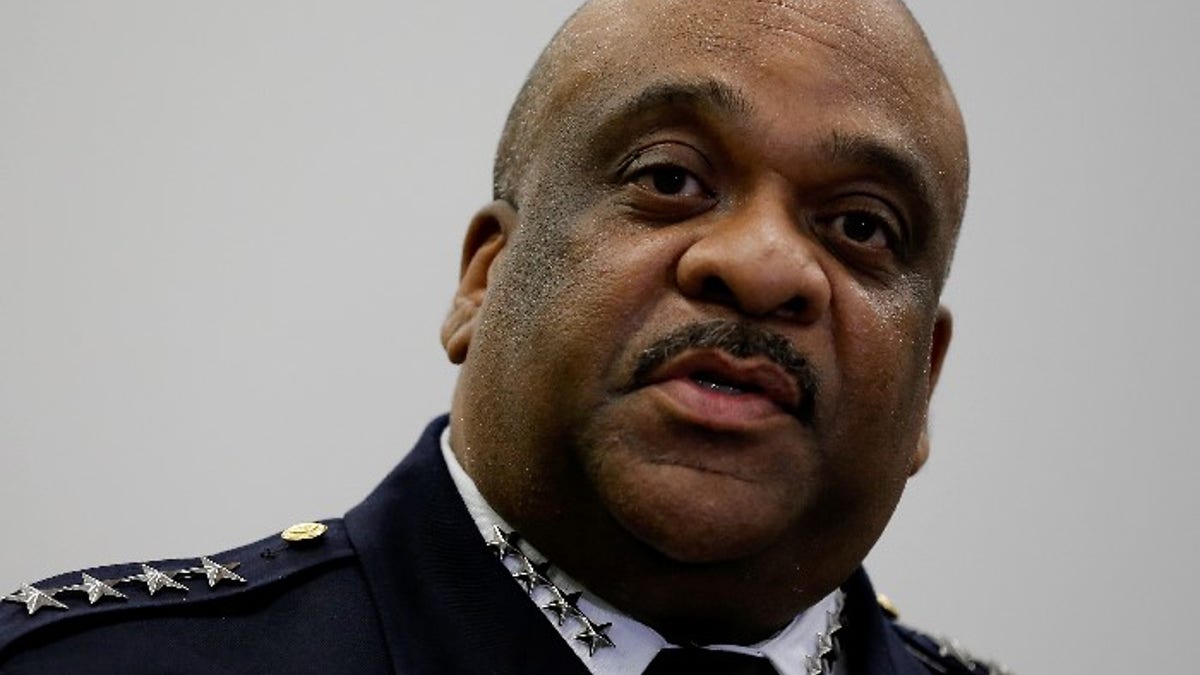
Crime scene where a number of people, including a 3-year-old child, were shot in a south side city park in Chicago, Sept. 19, 2013. (AP Photo)
The Chicago carnage continues unabated. More than 100 people were shot and 15 killed over the Fourth of July weekend alone. Year-to-date statistics for Chicago paint a grim picture with 2,000 people shot and 346 killed – a deadly pace that’s a step ahead of 2016’s grisly toll.
To help respond to the daily wail of sirens, one focus should be on enhancing penalties for repeat gun offenders and ensuring local judges enforce the law. At least, that’s what Superintendent of Police Eddie Johnson thinks.
He blames much of the violence on a broken criminal justice system that imposes weak sentences for gun offenders. Repeat gun offenders are, Johnson said, “recycled through the criminal justice system with a severe lack of accountability for the crimes that they commit. They are released back to the streets so quickly that they see no reason to change their behavior, and the cycle of violence just continues in our city.”

When discussing Chicago’s soaring shooting and murder rates, the focus too often drifts to “disproportionate policing” and disparate rates of citizen/police contact based on race. Too many ignore the plain realities of policing in broken urban areas, swaths of economic and educational deprivation that feed despair, gang recruitment, and intra-racial violence that serve as a powerful magnet for police engagement. With so many in the community and mainstream media ready to assume the fraudulent “mass incarceration” mantra, the truths of black on black crime is lost in the finger-pointing.
Political cowardice and ignorance often leads the charge backward, which is unfortunately also the direction of the city’s spiking homicide and violent crime rate – moving quickly toward the horrific numbers of the early 1990s.
While Chicago’s population is about one third black, in 2016 80 percent of shooting victims were black, as were a large majority of shooting offenders. Simply stated, black on black crime is the driver for disproportionate police engagement in the community, the driver for disproportionate friction with the community, and the driver for disproportionate black arrest and incarceration rates.
Beyond disproportionate criminality, multiple factors work in deadly combination in Chicago, as they have for decades. Political cowardice and ignorance often leads the charge backward, which is unfortunately also the direction of the city’s spiking homicide and violent crime rate – moving quickly toward the horrific numbers of the early 1990s.
While social scientists, politicians, pundits and others look for the drivers that make Chicago so volatile and deadly, Superintendent Johnson has begun calling one out – the endless cycle of violent gun offenders finding their way far too quickly out of police handcuffs and back onto the streets.
The superintendent is right. Despite anecdotal accounts of police misconduct, reality demonstrates that there are complex, often interrelated issues that feed downward spirals like that facing Chicago today. Among those issues is deterrence – the right combination of swiftness and surety of punishment that will keep some citizens from committing criminal offenses.
Superintendent Johnson points to unduly short pre-sentence detention and post-conviction sentences as a factor that undermines the deterrent value violent gun offenders badly need and future victims of gun violence are desperate for.
Republican leader of the Illinois House Jim Durkin, a former prosecutor, believes increasing the sentences for repeat gun offenders is one way to reduce shootings in Chicago. His proposed sentencing guidelines would require judges to sentence repeat gun offenders to 7-14 years behind bars instead of the present range of 3-14 years. Judges would be required to justify any deviation from the guidelines. The move would be consistent with new federal policies announced recently by Attorney General Jeff Sessions, who told prosecutors to work closely with federal, state, local and tribal authorities to target the most violent offenders in each district.
Representative Christian Mitchell, an African American representing three Chicago neighborhoods, and many African American members of the Illinois House initially opposed the legislation believing it would disproportionally affect minorities. While that may be true, they fail to see the bigger picture – that violent crime in neighborhoods they serve disproportionately affects all minority community members.
Some politicians, including those in Illinois, are beginning to understand the reality that violent criminals need to be locked up in order for the law-abiding to live peacefully.
Progress in Chicago can be hard to come by, but in a recent compromise, the Illinois legislature found common ground with an Offender Initiative Program amendment to Rep. Durkin’s legislation.
The program allows non-violent offenders without prior felony convictions to be placed on probation and go to school, find a job, make full restitution to the victim. Signed into law by the governor on June 23rd, the law gives first time non-violent offenders a second chance and recognizes that the community is safer when gun offenders are held accountable.
Illinois, and Chicago in particular, should monitor the success of the legislation and judges’ compliance with its terms. Deterrence and recidivism rates are critical to assessing the value of holding violent criminals accountable while showing mercy to the deserving.
